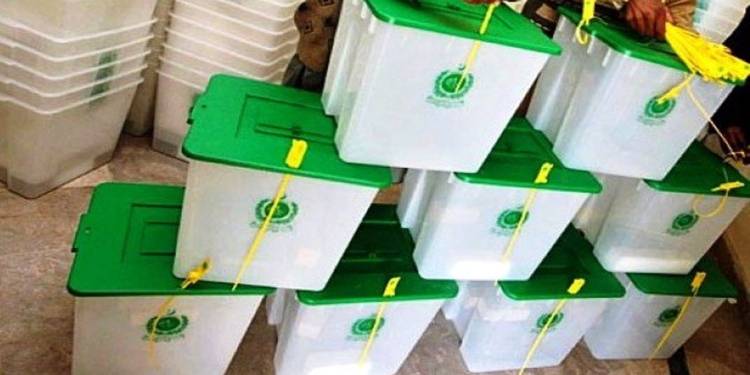
The Election Commission of Pakistan (ECP) has approached the Supreme Court (SC), requesting the apex court reconsider its directives regarding elections for the Punjab Assembly to be held on May 14, pleading with it not to become involved in its affairs.
In a petition, the ECP stated that the Supreme Court should review its decision because the judiciary doesn't have the authority to set the date of elections.
The Pakistan Tehreek-e-Insaf (PTI) announced that it would provide a thorough report of the talks between the party leaders and the ruling alliance hours before the petition was filed by the ECP, pleading with the Supreme Court to uphold its decision in the Punjab polls case.
The petition emphasized that the Constitution's Articles 199 and 184(3) offer the country's superior courts particular authority to judicially evaluate the activities and decisions of public organizations.
The boundaries within which the authority (which belongs to public entities) is or is to be exercised can be set by the superior courts. The petition stated that the superior courts "cannot ever assume the function of a public body."
The electoral board emphasized that it is "not the mandate of superior courts under the Constitution" to choose the election date.
The ECP asserted, citing several legal precedents and justifications, that "such powers exist elsewhere under the Constitution but certainly do not lie in a court of law."
By setting a date, the electoral body claimed that the Supreme Court had ignored its constitutional authority and that the court's intervention was therefore necessary to correct an error that had effectively altered the country’s established constitutional jurisprudence.
The Pakistan Democratic Movement-led government showed its disdain for the April 4 ruling by the apex court, which invalidated the ECP's decision to postpone the election in Punjab until October 8 this year after initially announcing it to take place on April 30. The executive and the judiciary, two essential state organs, appear to be on a collision course.
The decision on the PTI's petition contesting the ECP's decision to push back the Punjab Assembly elections to October was made public by a three-judge SC bench made up of Chief Justice of Pakistan Umar Ata Bandial, Justice Ijazul Ahsan, and Justice Munib Akhtar.
As the SC deemed the ECP's decision to be "unconstitutional," the chief justice declared that the election in Punjab would take place on May 14.
While the PTI applauded the "historic decision," the government referred to the verdict as an "impractical order" and said it went against the rulings of the Supreme Court's majority judges.
Since the PTI disbanded the Punjab and Khyber Pakhtunkhwa assemblies in January at Imran Khan's request, the debate over who has the power to choose the election date has been a hot topic.
In a petition, the ECP stated that the Supreme Court should review its decision because the judiciary doesn't have the authority to set the date of elections.
The Pakistan Tehreek-e-Insaf (PTI) announced that it would provide a thorough report of the talks between the party leaders and the ruling alliance hours before the petition was filed by the ECP, pleading with the Supreme Court to uphold its decision in the Punjab polls case.
The petition emphasized that the Constitution's Articles 199 and 184(3) offer the country's superior courts particular authority to judicially evaluate the activities and decisions of public organizations.
The boundaries within which the authority (which belongs to public entities) is or is to be exercised can be set by the superior courts. The petition stated that the superior courts "cannot ever assume the function of a public body."
The electoral board emphasized that it is "not the mandate of superior courts under the Constitution" to choose the election date.
The ECP asserted, citing several legal precedents and justifications, that "such powers exist elsewhere under the Constitution but certainly do not lie in a court of law."
By setting a date, the electoral body claimed that the Supreme Court had ignored its constitutional authority and that the court's intervention was therefore necessary to correct an error that had effectively altered the country’s established constitutional jurisprudence.
The Pakistan Democratic Movement-led government showed its disdain for the April 4 ruling by the apex court, which invalidated the ECP's decision to postpone the election in Punjab until October 8 this year after initially announcing it to take place on April 30. The executive and the judiciary, two essential state organs, appear to be on a collision course.
The decision on the PTI's petition contesting the ECP's decision to push back the Punjab Assembly elections to October was made public by a three-judge SC bench made up of Chief Justice of Pakistan Umar Ata Bandial, Justice Ijazul Ahsan, and Justice Munib Akhtar.
As the SC deemed the ECP's decision to be "unconstitutional," the chief justice declared that the election in Punjab would take place on May 14.
While the PTI applauded the "historic decision," the government referred to the verdict as an "impractical order" and said it went against the rulings of the Supreme Court's majority judges.
Since the PTI disbanded the Punjab and Khyber Pakhtunkhwa assemblies in January at Imran Khan's request, the debate over who has the power to choose the election date has been a hot topic.

